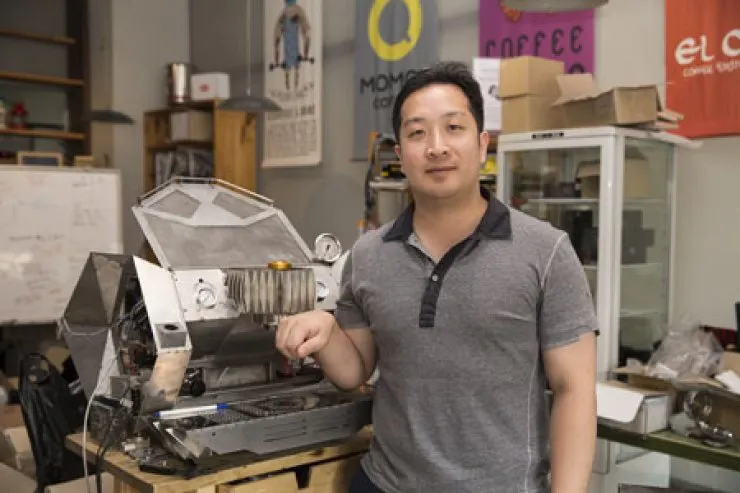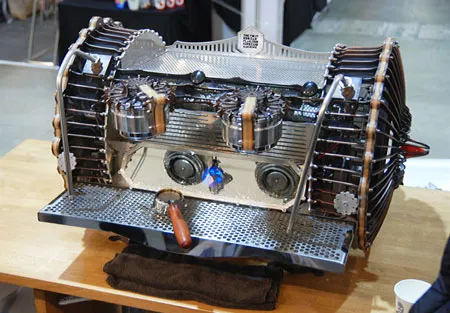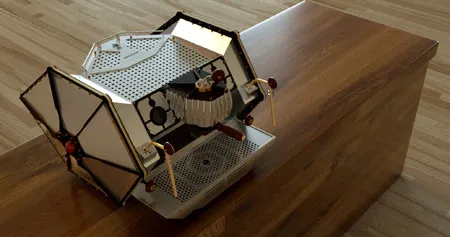Craftmanship for quality coffee
(Bang Jung-ho, barista and CEO of Designcoffee, poses with the prototype of Hexagon, the second commercial espresso machine he has developed, at his workroom in Haengdang-dong, Seoul, on Aug. 8.
/ Korea Times photo by Yoon Sung-won)
Barista-technician develops Korea's first commercial espresso machine
By Yoon Sung-won
"Commercial espresso machines used at local coffee shops are mostly imported," Bang Jung-ho, a barista-turned espresso machine developer said.
Bang, the CEO of Designcoffee, pointed out that the growth of industries related to products for coffee is very slow compared to the rapid expansion of coffee consumption in Korea.
According to the market researcher AC Nielsen Korea, the nation's coffee market reached 4.13 trillion won ($3.7 billion) in 2012, up 11.8 percent from 3.69 trillion won in 2011. When compared to 1.56 trillion won in 2007, the market size has recorded more than a twofold growth in five years.
The market expansion has influenced local consumers' coffee tastes. More people are apt to buy premium coffee brewed on-the-spot at coffee shops.
An increasing number of coffee shops here reflect the trend. According to NICEBIZMAP, an online website that provides analysis of commercial areas, the number of coffee shops in Korea reached 18,784 in April this year, up more than 2,500 stores from a year earlier.
(Revolucion, the first prototype of commercial espresso machine developed by Bang Jung-ho, is displayed at the Seoul Cafe Show in COEX, southern Seoul, in November 2012)
More Koreans willingly pay several thousand won for a cup of coffee as we can easily find shops packed with customers of all ages.
Even though coffee has become more popular among Koreans and the number of coffee shops is increasing, the coffee machine market here is heavily dependent on foreign manufacturers. According to the Korea Customs Service (KCS) data, the import value of the appliances used for producing hot beverages like coffee stood at $74 million in 2012, whereas the export value was only $10 million.
"I have wondered why Korea has yet to develop a homegrown commercial espresso machine, even though there are newly-opened coffee shops everywhere here."
Made in Korea
Bang ran a coffee shop named "La Cafe" since 2006 in Haengdang-dong, Seoul. As a barista and a coffee shop owner, he has found inconveniences using espresso machines. In 2009, Bang launched his machine brand Vidas and started to develop commercial espresso machines entirely with domestic technologies.
Bang, who also has collected old espresso machines produced in different times, disassembled and analyzed the structure of the old models to better understand their advantages.
In 2012, he succeeded in developing Revolucion, the first prototype of espresso machine made entirely with domestic technology. To solve problems that baristas encounter while brewing coffee with espresso machines, he invited other baristas to join in the development process and asked them for practical advice.
(Hexagon, Vidas' second commercial espresso machine developed with Korean technology. / Courtesy of Designcoffee
Since the machine was a concept product, Bang said he focused on testing new ideas with his prototype. Bang adapted a variable pressure system for Revolucion that was inspired by his analysis of old manual espresso machines. With this system, baristas can choose between intervening in detailed and subtle parts of producing coffee, such as controlling temperature and pressure, and just leaving most of the brewing process up to the machine.
Bang also said he respected the creativity and aesthetics of designers from Studio P Square, a design firm he has cooperated with while manufacturing Revolucion. Instead of stainless steel plates that are generally used for commercial coffee machines, Revolucion's exterior is made with metallic frames that give the machine a unique and antique look.
In November 2012, Bang released the fully operating model of Revolucion at the Seoul Cafe Show held in COEX in Samseong-dong, southern Seoul, and demonstrated brewing coffee before visitors.
Connecting IT to analog
Backed by the successful development and demonstration of his first prototype, Bang has manufactured his second product called Hexagon. The second model is not only different from the previous one in design, but it also connects IT technology with the espresso machine.
Bang devised a new technology for commercial espresso machines, connecting his academic background in computer engineering with the machine. Under industry-academic cooperation with Hannam University in Daejeon, Bang researched a quality management system for commercial espresso machines. The system automatically collects data such as pressure and temperature when baristas use the machine to produce coffee. Then it compiles the collected data into a large database online. The database can be provided for baristas to maintain the optimal settings to produce high quality coffee.
"The technology is expected to be especially useful for coffee franchise owners," the CEO said. "They can standardize the quality of the coffee produced in its stores regardless of who handles the machine to produce it."
Different from the latest system Bang has devised, technologies necessary for espresso machines are not rocket science. Most of them are already being used in other industrial sectors. Bang emphasized that what's important in developing a well-made espresso machine is to fine-tune balances between the settings such as temperature and pressure without losing aesthetic beauty.
The CEO received pre-orders from 10 clients for his second espresso machine Hexagon, which costs 99 million won per unit.
"Since I adopted several new technologies for Hexagon, for now the price would be expensive compared to some mass-produced machines," Bang said. "In the future I'm planning to expand our product lineup to be less expensive and include smaller models for households."
The CEO said he is also thinking of showcasing Hexagon at overseas coffee machine exhibitions and exporting it to the global markets.
"My goal is not just to sell product in the global markets, but to provide long-term follow-up services for the machines we would sell to establish a trustworthy espresso machine brand at home and abroad," he said.
Necessary craftsmanship
The barista-technician said that the increasing popularity of capsule coffee can be a positive sign for the espresso machine market and the growth of the entire coffee industry in the long run.
"It hasn't been long since many Koreans started to enjoy premium coffee after meals. The market for high quality coffee here has yet to mature, and the number of people who enjoy it regularly is not as high as in western countries," he continued. "Those who just started to enjoy coffee may still hesitate to pay for a cup of coffee that costs as much as a meal."
Bang realized undoubtedly that few people would consider buying an espresso machine that would cost more than a million won. Instead, they would buy a capsule coffee brewer that costs much less than an espresso machine and which is far easier to use.
"But once there are more customers who are fond of drinking high quality coffee, some of them may be inclined to buy espresso machines. The market for high quality coffee, as well as for equipment to produce it, will be expanded," he said.
The CEO worried that the inflow of huge capital to the local coffee machine industry would have a negative impact.
"There are several small- and medium-sized companies and individuals who develop espresso machines with craftsmanship, even though they are under financial difficulties," Bang said. "Small firms just cannot fight if large conglomerates capable of producing cheaper machines jump into the market. I believe craftsmanship is necessary for innovative ideas and quality products."
Kees Van Der Westen, a Dutch enterprise that manufactures high-end commercial espresso machines, has greatly influenced me to design Revolucion and Hexagon. "The company's enthusiasm and craftsmanship are well-reflected in its products, which I'd like to call masterpieces," he said. "I will pursue the craftsmanship, which I have dreamed of from the beginning, to produce globally-recognized espresso machines."




.jpg&blockId=b124debe-3ac8-4260-a108-252c575b2b9a&width=512)
